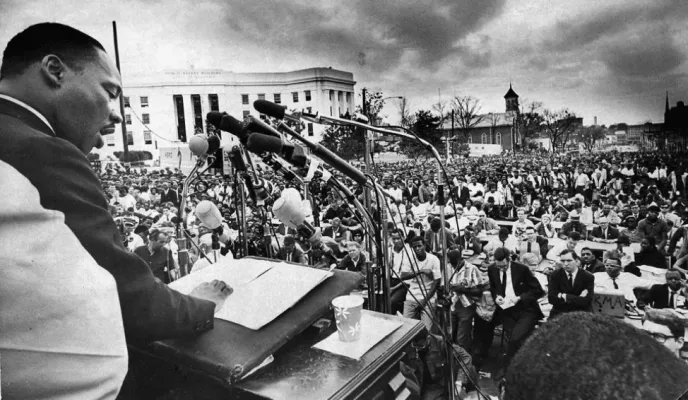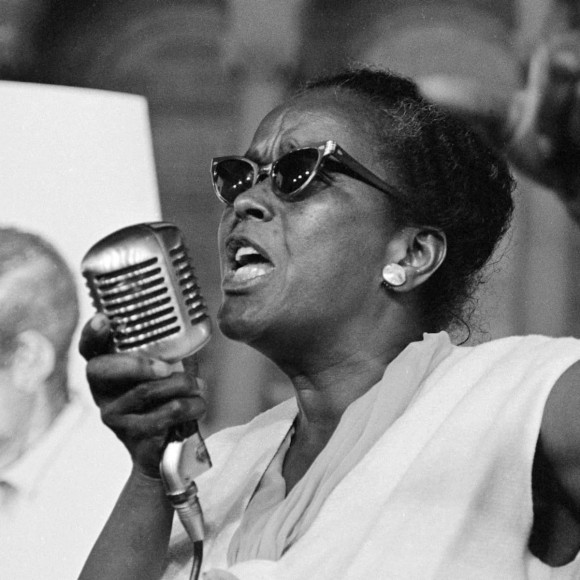Voices of Democracy: A Resource for Civic Education

Dr. Martin Luther King, Jr., addressing the crowd at a voting rights march from Selma to Montgomery, Alabama on March 25, 1965. Photo courtesy of the Dolph Briscoe Center for American History, the University of Texas—Austin.
Voices of Democracy (VOD) is a pioneering digital humanities initiative providing texts and curriculum resources for the study of great speeches and debates in US history. Originally funded by a grant from the National Endowment for the Humanities (NEH) and directed by J. Michael Hogan and Shawn J. Parry-Giles, VOD publishes complete, unabridged, and authenticated texts of significant speeches, along with critical essays illuminating each speech’s historical context, rhetorical strategies and style, and legacy in US history and public memory.
VOD is organized around seven recurrent themes, or “deliberative topics,” in US history—Citizenship and Civic Identity, Economic and Social Justice, Religion and Public Morality, Freedom of Speech, U.S. Internationalism, and War and Peace. Within each category, VOD features speeches that speak to enduring controversies in American history, from the nation’s long struggle with racial injustice to ongoing debates over America’s role in world affairs.
The teaching and learning materials accompanying each speech include questions for classroom discussion, ideas for student research, and “citizenship resources” that encourage students to reflect on how each speech relates to ongoing political or social controversies. There is also a guide to additional resources for each speech, including lists of recommended readings, audio-visual materials, and online resources. When available, VOD includes an audio or video recording (or a link to a recording) of each speech.
While designed primarily for undergraduate teachers and students in rhetoric, history, and related disciplines, VOD has appeal for educators across disciplines and grade levels. It is widely used in both online and in-person classes at the college level, and it includes a growing collection of lesson plans for Grade 8-12 teachers. Based on the Common Core State Standards (CCSS) in English Language Arts and History/Social Studies, these lesson plans are easily adapted to other educational contexts.
Since its creation in 2006, VOD has grown to include 86 speeches and associated curriculum materials, along with 22 lesson plans for grades 8-12. The site also includes a section called Spotlight on Oratory, which is a collection of short essays that highlight rhetorical or pedagogical issues associated with speeches on the site.
VOD recently published two special issues, a Woman Suffrage Centennial Issue and another on the Rhetoric of the Civil Rights Movement. VOD also has partnered with the journal Young Scholars in Writing (YSW) and others to sponsor a Civil Rights Essay Contest. Open to all undergraduate students, the contest offers cash prizes and a chance for students to publish their work in YSW. VOD’s collection of civil rights speeches was recently featured on EDSITEment, the NEH’s guide to the best educational resources on the web. In an article entitled “Women Leaders of the Civil Rights Struggle,” EDSITEment called attention to VOD’s resources on Fannie Lou Hamer, Sojourner Truth, Ida B. Wells, Maria W. Miller Stewart, Ella Baker, Shirley Chisholm, and other civil rights activists from the 19th and 20th centuries.

The study of great speeches has been used for centuries to educate for democratic citizenship. By studying speeches, students learn to read complex texts critically, evaluating their argumentation, their appeals to emotion or prejudice, and their rhetorical techniques and style. Studying speeches also teaches the rhetorical and ethical principles that make for responsible public advocacy, critical thinking, and informed civic engagement. By promoting the study of great speeches, VOD helps to combat what former NEH chairman Bruce Cole once called “Our American Amnesia”—the lack of understanding, particularly among young people, of our nation’s past, its founding principles, and its deliberative institutions and traditions.
In recent years, VOD has averaged about 1000 visitors a day during the academic year, and it has attracted users from more than 100 countries around the world. Graduate and undergraduate students from Penn State, the University of Maryland, and elsewhere have contributed content or served as research assistants on the project. Ongoing funding for VOD is provided by the Department of Communication and the Rosenker Center for Political Communication and Civic Leadership at the University of Maryland, along with the Center for Democratic Deliberation and the McCourtney Institute for Democracy at Penn State.
For more information about VOD, including guidelines for contributors, visit the VOD website.
J. Michael Hogan is Edwin Erle Sparks Professor Emeritus of Rhetoric at the Pennsylvania State University. He co-directs the Voices of Democracy project with Shawn J. Parry-Giles, professor and chair of communication at the University of Maryland.